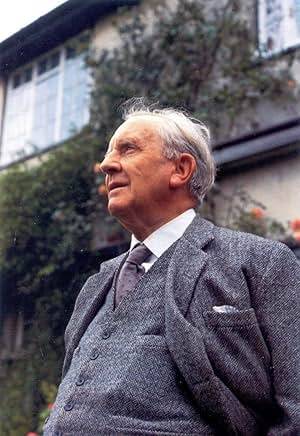John Ronald Reuel Tolkien, commonly known as J.R.R. Tolkien, was an English writer, philologist, and academic best known for his groundbreaking works in the fantasy genre, particularly "The Hobbit" and "The Lord of the Rings." Born on January 3, 1892, in Bloemfontein, South Africa, Tolkien's life and literary contributions have had a profound impact on literature and popular culture.
#### Early Life and Education
Tolkien was the son of Arthur Reuel Tolkien and Mabel Suffield. After the death of his father in 1896, Mabel moved her three children back to England. Tolkien's early life was marked by a love for nature, language, and stories. He developed a passion for philology, the study of languages, during his time at Exeter College, Oxford, where he later earned a degree in English Language and Literature.
After completing his studies, Tolkien served in the British Army during World War I, where he fought in the Battle of the Somme. The experiences he endured during the war deeply influenced his later writing, particularly the themes of friendship, sacrifice, and the impact of evil.
#### Literary Career
Tolkien's literary career began with his work as a professor of Anglo-Saxon at the University of Oxford. His academic background in languages and mythology greatly influenced his fiction. In the 1930s, he began writing "The Hobbit," which was published in 1937. This children's fantasy novel introduced readers to the world of Middle-earth and the character of Bilbo Baggins, a hobbit who embarks on an unexpected adventure with a group of dwarves and the wizard Gandalf.
"The Hobbit" was met with critical acclaim and commercial success, paving the way for Tolkien's next major work, "The Lord of the Rings." Originally conceived as a sequel to "The Hobbit," this epic trilogy, published in three volumes between 1954 and 1955, expanded the scope of Middle-earth and introduced a rich tapestry of characters, languages, and histories. The story follows the quest to destroy the One Ring and features iconic characters such as Frodo Baggins, Aragorn, Legolas, and Gollum.
Tolkien's world-building, intricate plots, and deep themes of heroism, friendship, and the battle between good and evil set new standards for fantasy literature. His work has inspired countless authors and has become a cornerstone of the genre.
#### Legacy and Cultural Impact
J.R.R. Tolkien's influence extends far beyond literature. His works have been adapted into successful films, most notably Peter Jackson's film adaptations of "The Lord of the Rings" and "The Hobbit." These films brought Tolkien's stories to a new generation of fans and significantly contributed to the resurgence of interest in fantasy literature and culture.
Tolkien's creation of languages, such as Elvish and Dwarvish, showcases his linguistic expertise and adds depth to his fictional world. He also wrote extensively about the mythology and history of Middle-earth, including "The Silmarillion," published posthumously in 1977 by his son, Christopher Tolkien.
Tolkien's impact on popular culture is immense, with numerous adaptations, merchandise, and even academic courses dedicated to his work. He is often regarded as the "father of modern fantasy," inspiring a plethora of authors, filmmakers, and artists who have followed in his footsteps.
#### Personal Life
Tolkien married Edith Bratt in 1916, and they had four children together: John, Michael, Christopher, and Priscilla. The family was closely knit, and Tolkien often drew upon his experiences as a father in his storytelling. He was a devout Christian, and his faith influenced many of the themes present in his writings.
Tolkien passed away on September 2, 1973, at the age of 81. He left behind a rich legacy of literature and a devoted fanbase that continues to celebrate his work.
### Conclusion
J.R.R. Tolkien's contributions to literature and fantasy cannot be overstated. His imaginative storytelling, intricate world-building, and deep exploration of themes have captivated readers for generations. Through his works, Tolkien created a timeless legacy that continues to inspire and shape the landscape of fantasy literature and beyond, securing his place as one of the most beloved writers in history.




No comments yet
Be the first to share your thoughts!